
Unit 5 Dreams In-Class Reading Are You a Dreamer? Words&Usage词汇精讲 conscious n.自觉的,有意识的(Line11,Para4) [用法1]be conscious of有意识的,了解的 e.g.She was not conscious of his presence in the room. 她不知道他在这房间里。 [反义词链接]unconscious [拓展记忆]consciousness n.意识 subconscious adj.下意识的 interpretation n.解释,说明(Line4,Para8) [构词法]-ion名词后缀,表示行为,过程,状态,情况。 [相关词汇]conjunction n.联合,关联decoration n.装饰 installation n.安装 [拓展记忆]interpret v.解释,说明 interpreter n.表演者,演奏者:口译者 recognizable adj,可以确认的,可以辨别的(Line2,Para6) e.g.Caroline has very recognizable handwriting. 卡罗琳的笔迹很容易辨认。 [构词法]-able形容词后缀,表示“能...的”。 [相关词汇]indispensable adj.不可缺少 inevitable adj.不可避免的 invaluable adj..无价的 profitable adj.有利可图的 [拓展记忆]recognize v.认出,认可 recognition n.认出,认可 be tied up with和…有密切关系(Line6,Para9) e.g.Is the allergy tied up with anything you've eaten? 过敏和你吃的什么东西有关吗? [同义词链接]be connected with,be related with apart from除了(Line 1,Para3) e.g.Apart from the salary,it's not a bad job..除了薪水,这是一份不错的工作。 [同义词链接]except,in addition to
1 Unit 5 Dreams In-Class Reading Are You a Dreamer? Words & Usage 词汇精讲 conscious n.自觉的,有意识的(Line 11, Para 4) [用法 1] be conscious of 有意识的,了解的 e.g. She was not conscious of his presence in the room. 她不知道他在这房间里。 [反义词链接]unconscious [拓展记忆] consciousness n.意识 subconscious adj.下意识的 interpretation n.解释,说明(Line 4, Para 8) [构词法] -ion 名词后缀,表示行为,过程,状态,情况。 [相关词汇]conjunction n.联合,关联 decoration n. 装饰 installation n.安装 [拓展记忆]interpret v.解释,说明 interpreter n.表演者,演奏者;口译者 recognizable adj.可以确认的,可以辨别的(Line 2, Para 6) e.g. Caroline has very recognizable handwriting. 卡罗琳的笔迹很容易辨认。 [构词法]-able 形容词后缀,表示“能… … 的”。 [相关词汇]indispensable adj.不可缺少 inevitable adj.不可避免的 invaluable adj.无价的 profitable adj.有利可图的 [拓展记忆]recognize v.认出,认可 recognition n.认出,认可 be tied up with 和…有密切关系(Line 6, Para 9) e.g. Is the allergy tied up with anything you’ve eaten? 过敏和你吃的什么东西有关吗? [同义词链接]be connected with , be related with apart from 除了(Line 1, Para 3) e.g. Apart from the salary, it’s not a bad job.除了薪水,这是一份不错的工作。 [同义词链接]except , in addition to
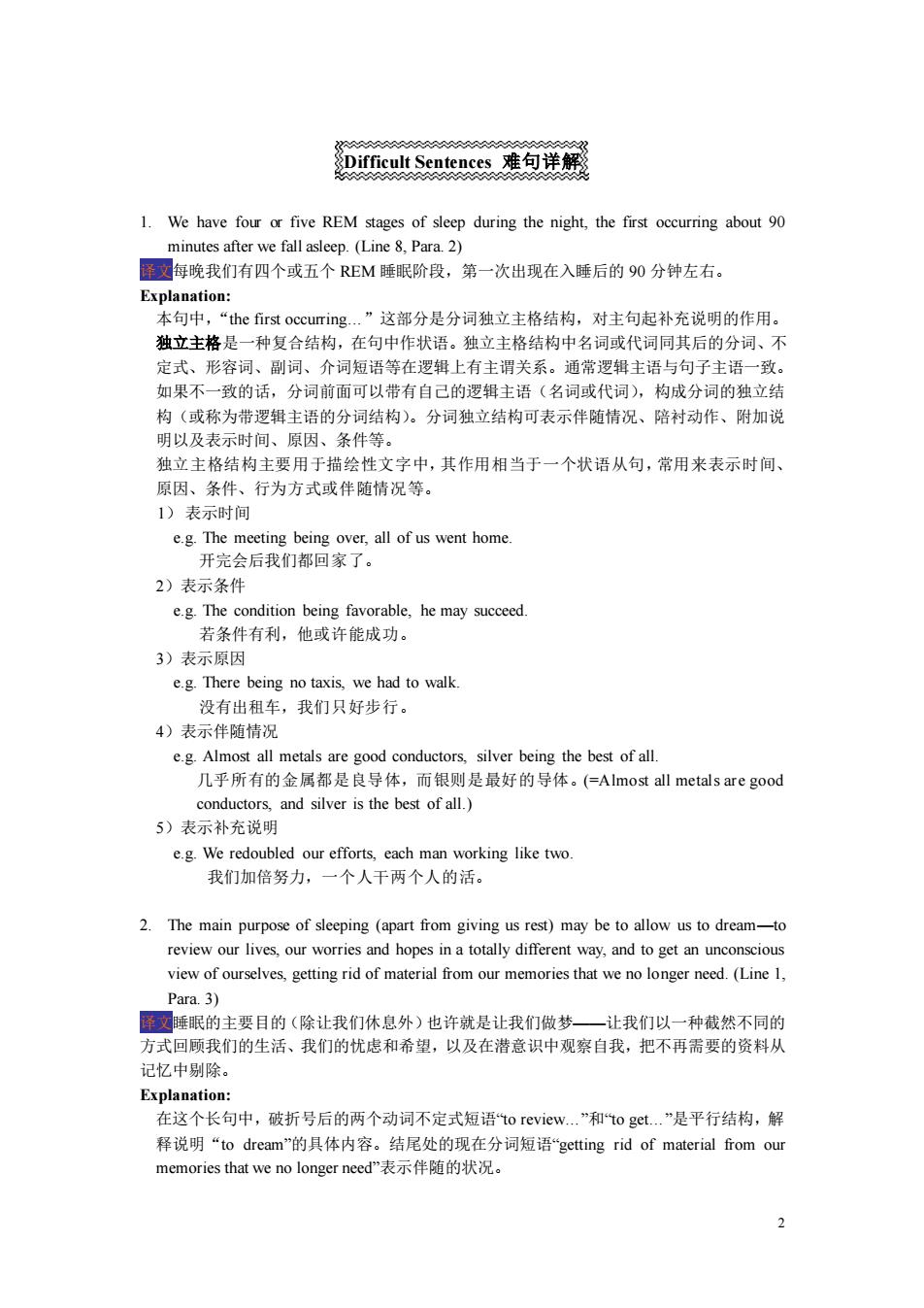
Difficult Sentences难包详解 AVAVAAVAVAAAVAAVAAA 1.We have four or five REM stages of sleep during the night,the first occurring about 90 minutes after we fall asleep.(Line 8,Para.2) 译文每晚我们有四个或五个REM睡眠阶段,第一次出现在入睡后的90分钟左右。 Explanation: 本句中,“the first occurring.”这部分是分词独立主格结构,对主句起补充说明的作用。 独立主格是一种复合结构,在句中作状语。独立主格结构中名词或代词同其后的分词、不 定式、形容词、副词、介词短语等在逻辑上有主谓关系。通常逻辑主语与句子主语一致。 如果不一致的话,分词前面可以带有自己的逻辑主语(名词或代词),构成分词的独立结 构(或称为带逻辑主语的分词结构)。分词独立结构可表示伴随情况、陪衬动作、附加说 明以及表示时间、原因、条件等。 独立主格结构主要用于描绘性文字中,其作用相当于一个状语从句,常用来表示时间、 原因、条件、行为方式或伴随情况等。 1)表示时间 e.g.The meeting being over,all of us went home. 开完会后我们都回家了。 2)表示条件 e.g.The condition being favorable,he may succeed. 若条件有利,他或许能成功。 3)表示原因 e.g.There being no taxis,we had to walk. 没有出租车,我们只好步行。 4)表示伴随情况 e.g.Almost all metals are good conductors,silver being the best of all. 几乎所有的金属都是良导体,而银则是最好的导体。(=Almost all metals are good conductors,and silver is the best of all.) 5)表示补充说明 e.g.We redoubled our efforts,each man working like two. 我们加倍努力,一个人干两个人的活。 2.The main purpose of sleeping (apart from giving us rest)may be to allow us to dream-to review our lives,our worries and hopes in a totally different way,and to get an unconscious view of ourselves,getting rid of material from our memories that we no longer need.(Line 1, Para.3) 译文睡眠的主要目的(除让我们休息外)也许就是让我们做梦一让我们以一种截然不同的 方式回顾我们的生活、我们的忧虑和希望,以及在潜意识中观察自我,把不再需要的资料从 记忆中剔除。 Explanation: 在这个长句中,破折号后的两个动词不定式短语to review..”和to get..”是平行结构,解 释说明“to dream”的具体内容。结尾处的现在分词短语“getting rid of material from our memories that we no longer need”表示伴随的状况。 2
2 Difficult Sentences 难句详解 1. We have four or five REM stages of sleep during the night, the first occurring about 90 minutes after we fall asleep. (Line 8, Para. 2) 译文每晚我们有四个或五个 REM 睡眠阶段,第一次出现在入睡后的 90 分钟左右。 Explanation: 本句中,“the first occurring…”这部分是分词独立主格结构,对主句起补充说明的作用。 独立主格是一种复合结构,在句中作状语。独立主格结构中名词或代词同其后的分词、不 定式、形容词、副词、介词短语等在逻辑上有主谓关系。通常逻辑主语与句子主语一致。 如果不一致的话,分词前面可以带有自己的逻辑主语(名词或代词),构成分词的独立结 构(或称为带逻辑主语的分词结构)。分词独立结构可表示伴随情况、陪衬动作、附加说 明以及表示时间、原因、条件等。 独立主格结构主要用于描绘性文字中,其作用相当于一个状语从句,常用来表示时间、 原因、条件、行为方式或伴随情况等。 1) 表示时间 e.g. The meeting being over, all of us went home. 开完会后我们都回家了。 2)表示条件 e.g. The condition being favorable, he may succeed. 若条件有利,他或许能成功。 3)表示原因 e.g. There being no taxis, we had to walk. 没有出租车,我们只好步行。 4)表示伴随情况 e.g. Almost all metals are good conductors, silver being the best of all. 几乎所有的金属都是良导体,而银则是最好的导体。(=Almost all metals are good conductors, and silver is the best of all.) 5)表示补充说明 e.g. We redoubled our efforts, each man working like two. 我们加倍努力,一个人干两个人的活。 2. The main purpose of sleeping (apart from giving us rest) may be to allow us to dream—to review our lives, our worries and hopes in a totally different way, and to get an unconscious view of ourselves, getting rid of material from our memories that we no longer need. (Line 1, Para. 3) 译文睡眠的主要目的(除让我们休息外)也许就是让我们做梦——让我们以一种截然不同的 方式回顾我们的生活、我们的忧虑和希望,以及在潜意识中观察自我,把不再需要的资料从 记忆中剔除。 Explanation: 在这个长句中,破折号后的两个动词不定式短语“to review…”和“to get…”是平行结构,解 释说明“to dream”的具体内容。结尾处的现在分词短语“getting rid of material from our memories that we no longer need”表示伴随的状况
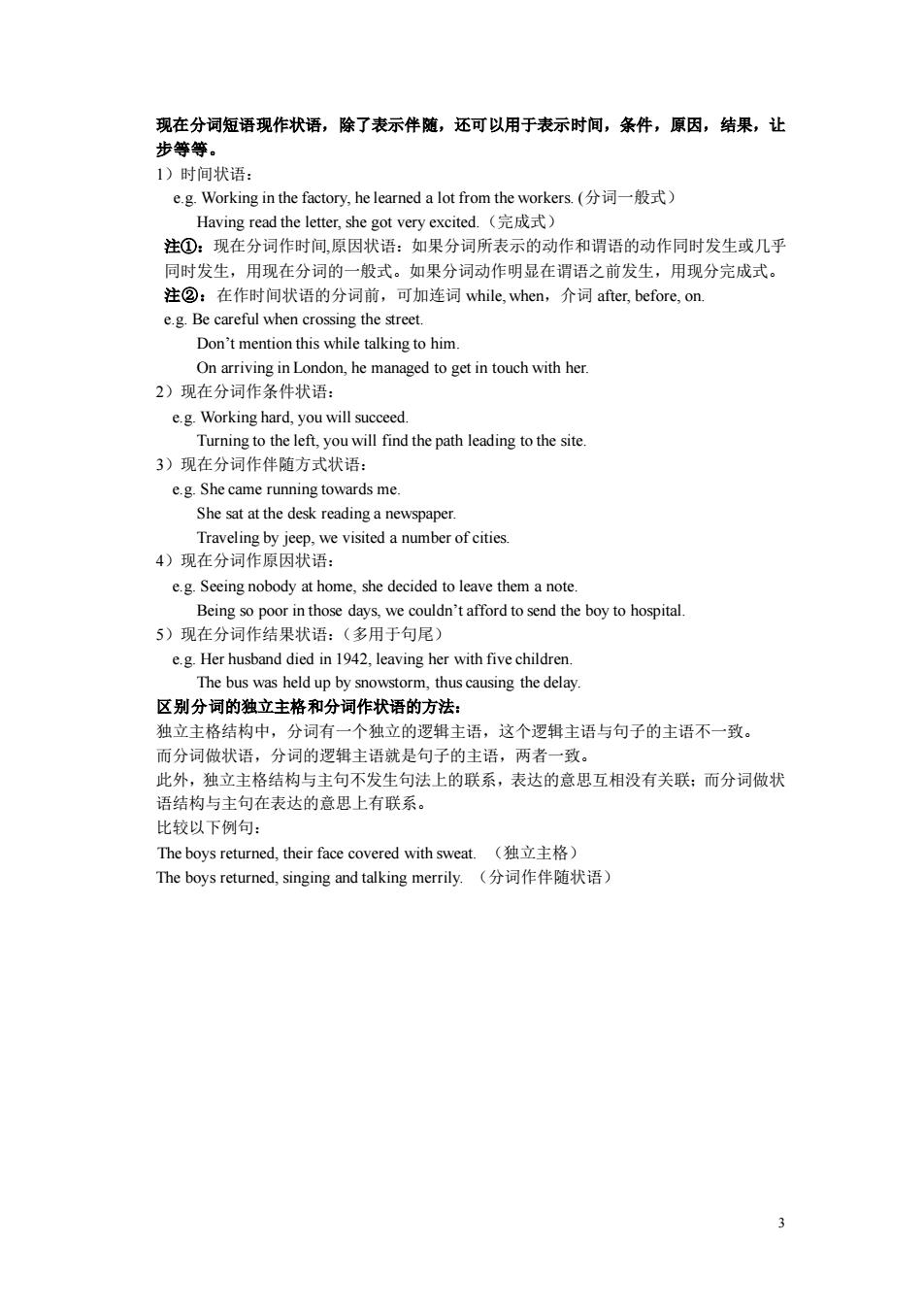
现在分词短语现作状语,除了表示伴随,还可以用于表示时间,条件,原因,结果,让 步等等。 1)时间状语: e.g.Working in the factory,he learned a lot from the workers..(分词一般式) Having read the letter,,she got very excited..(完成式) 注①:现在分词作时间,原因状语:如果分词所表示的动作和谓语的动作同时发生或几乎 同时发生,用现在分词的一般式。如果分词动作明显在谓语之前发生,用现分完成式。 注②:在作时间状语的分词前,可加连词while,.when,介词after,,before,on. e.g.Be careful when crossing the street. Don't mention this while talking to him. On arriving in London,he managed to get in touch with her. 2)现在分词作条件状语: e.g.Working hard,you will succeed. Turning to the left,you will find the path leading to the site. 3)现在分词作伴随方式状语: e.g.She came running towards me. She sat at the desk reading a newspaper Traveling by jeep,we visited a number of cities. 4)现在分词作原因状语: e.g.Seeing nobody at home,she decided to leave them a note. Being so poor in those days,we couldn't afford to send the boy to hospital. 5)现在分词作结果状语:(多用于句尾) e.g.Her husband died in 1942,leaving her with five children. The bus was held up by snowstorm,thus causing the delay. 区别分词的独立主格和分词作状语的方法: 独立主格结构中,分词有一个独立的逻辑主语,这个逻辑主语与句子的主语不一致。 而分词做状语,分词的逻辑主语就是句子的主语,两者一致。 此外,独立主格结构与主句不发生句法上的联系,表达的意思互相没有关联:而分词做状 语结构与主句在表达的意思上有联系。 比较以下例句: The boys returned,their face covered with sweat..(g独立主格) The boys returned,singing and talking merrily.(分词作伴随状语) 3
3 现在分词短语现作状语,除了表示伴随,还可以用于表示时间,条件,原因,结果,让 步等等。 1)时间状语: e.g. Working in the factory, he learned a lot from the workers. (分词一般式) Having read the letter, she got very excited.(完成式) 注①:现在分词作时间,原因状语:如果分词所表示的动作和谓语的动作同时发生或几乎 同时发生,用现在分词的一般式。如果分词动作明显在谓语之前发生,用现分完成式。 注②:在作时间状语的分词前,可加连词 while, when,介词 after, before, on. e.g. Be careful when crossing the street. Don’t mention this while talking to him. On arriving in London, he managed to get in touch with her. 2)现在分词作条件状语: e.g. Working hard, you will succeed. Turning to the left, you will find the path leading to the site. 3)现在分词作伴随方式状语: e.g. She came running towards me. She sat at the desk reading a newspaper. Traveling by jeep, we visited a number of cities. 4)现在分词作原因状语: e.g. Seeing nobody at home, she decided to leave them a note. Being so poor in those days, we couldn’t afford to send the boy to hospital. 5)现在分词作结果状语:(多用于句尾) e.g. Her husband died in 1942, leaving her with five children. The bus was held up by snowstorm, thus causing the delay. 区别分词的独立主格和分词作状语的方法: 独立主格结构中,分词有一个独立的逻辑主语,这个逻辑主语与句子的主语不一致。 而分词做状语,分词的逻辑主语就是句子的主语,两者一致。 此外,独立主格结构与主句不发生句法上的联系,表达的意思互相没有关联;而分词做状 语结构与主句在表达的意思上有联系。 比较以下例句: The boys returned, their face covered with sweat. (独立主格) The boys returned, singing and talking merrily. (分词作伴随状语)
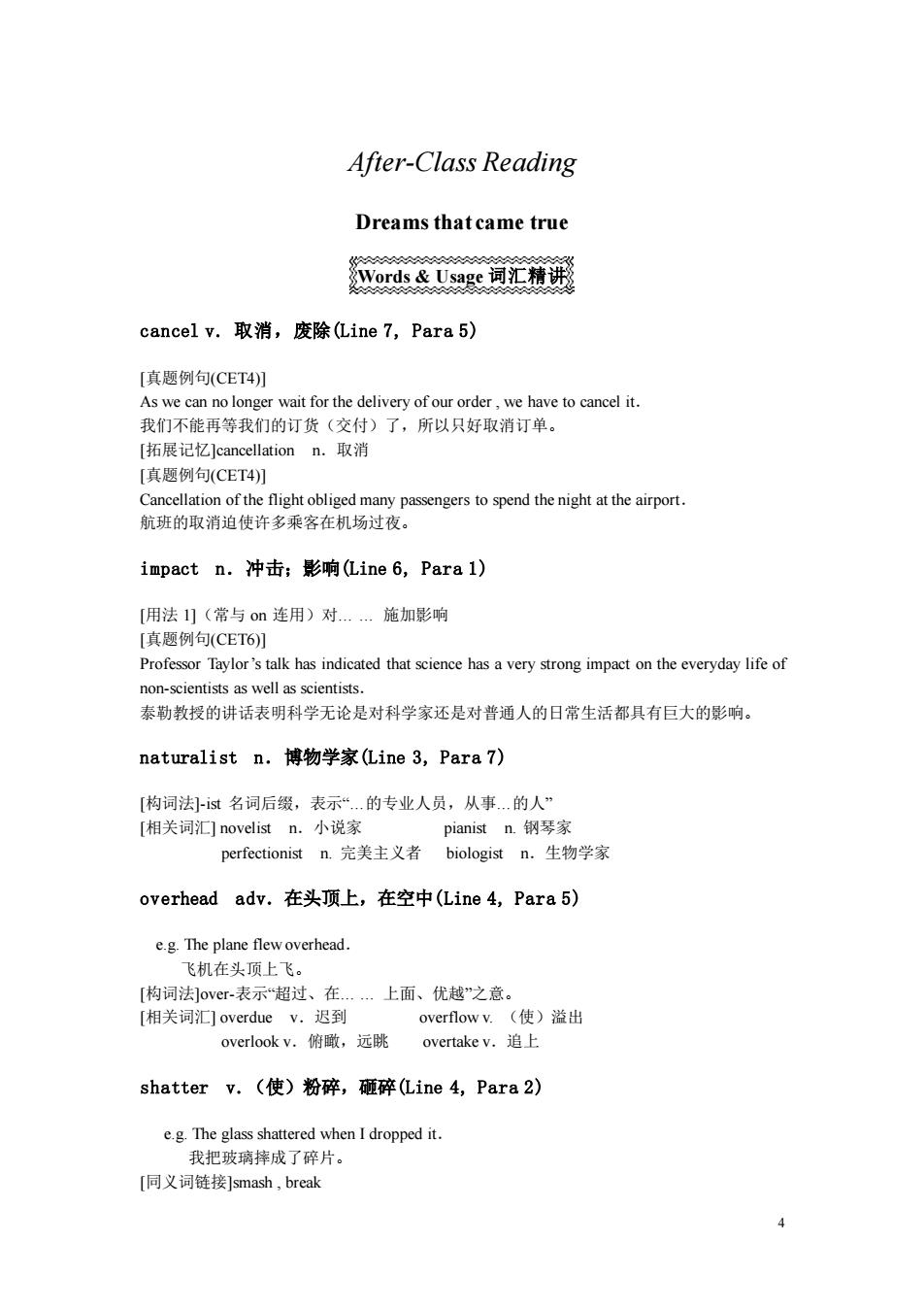
After-Class Reading Dreams that came true oris&e词汇辩进 AAAAAAAAA cancel v.取消,废除(Line7,Para5) [真题例句(CET4)] As we can no longer wait for the delivery of our order,we have to cancel it. 我们不能再等我们的订货(交付)了,所以只好取消订单。 [拓展记忆]cancellation n.取消 [真题例句(CET4)] Cancellation of the flight obliged many passengers to spend the night at the airport. 航班的取消迫使许多乘客在机场过夜。 impact n.冲击;影响Line6,Para 1) [用法1](常与on连用)对...…施加影响 [真题例句(CET6)] Professor Taylor's talk has indicated that science has a very strong impact on the everyday life of non-scientists as well as scientists. 泰勒教授的讲话表明科学无论是对科学家还是对普通人的日常生活都具有巨大的影响。 naturalist n.博物学家(亿ine3,Para7) [构词法]-t名词后缀,表示“的专业人员,从事.的人” [相关词汇]novelist n.小说家 pianist n.钢琴家 perfectionist n.完美主义者biologist n.生物学家 overhead adv,在头顶上,在空中(Line4,Para5) e.g.The plane flew overhead. 飞机在头顶上飞。 [构词法]over-表示超过、在...上面、优越”之意。 [相关词汇]overdue v.迟到 overflow v.(使)溢出 overlook v.俯瞰,远跳overtake v.追上 shatter v.(使)粉碎,砸碎(Line4,Para2) e.g.The glass shattered when I dropped it. 我把玻璃摔成了碎片。 [同义词链接]smash,break
4 After-Class Reading Dreams that came true Words & Usage 词汇精讲 cancel v. 取消,废除(Line 7, Para 5) [真题例句(CET4)] As we can no longer wait for the delivery of our order , we have to cancel it. 我们不能再等我们的订货(交付)了,所以只好取消订单。 [拓展记忆]cancellation n.取消 [真题例句(CET4)] Cancellation of the flight obliged many passengers to spend the night at the airport. 航班的取消迫使许多乘客在机场过夜。 impact n.冲击;影响(Line 6, Para 1) [用法 1](常与 on 连用)对… … 施加影响 [真题例句(CET6)] Professor Taylor’s talk has indicated that science has a very strong impact on the everyday life of non-scientists as well as scientists. 泰勒教授的讲话表明科学无论是对科学家还是对普通人的日常生活都具有巨大的影响。 naturalist n.博物学家(Line 3, Para 7) [构词法]-ist 名词后缀,表示“…的专业人员,从事…的人” [相关词汇] novelist n.小说家 pianist n. 钢琴家 perfectionist n. 完美主义者 biologist n.生物学家 overhead adv.在头顶上,在空中(Line 4, Para 5) e.g. The plane flew overhead. 飞机在头顶上飞。 [构词法]over-表示“超过、在… … 上面、优越”之意。 [相关词汇] overdue v.迟到 overflow v. (使)溢出 overlook v.俯瞰,远眺 overtake v.追上 shatter v.(使)粉碎,砸碎(Line 4, Para 2) e.g. The glass shattered when I dropped it. 我把玻璃摔成了碎片。 [同义词链接]smash , break
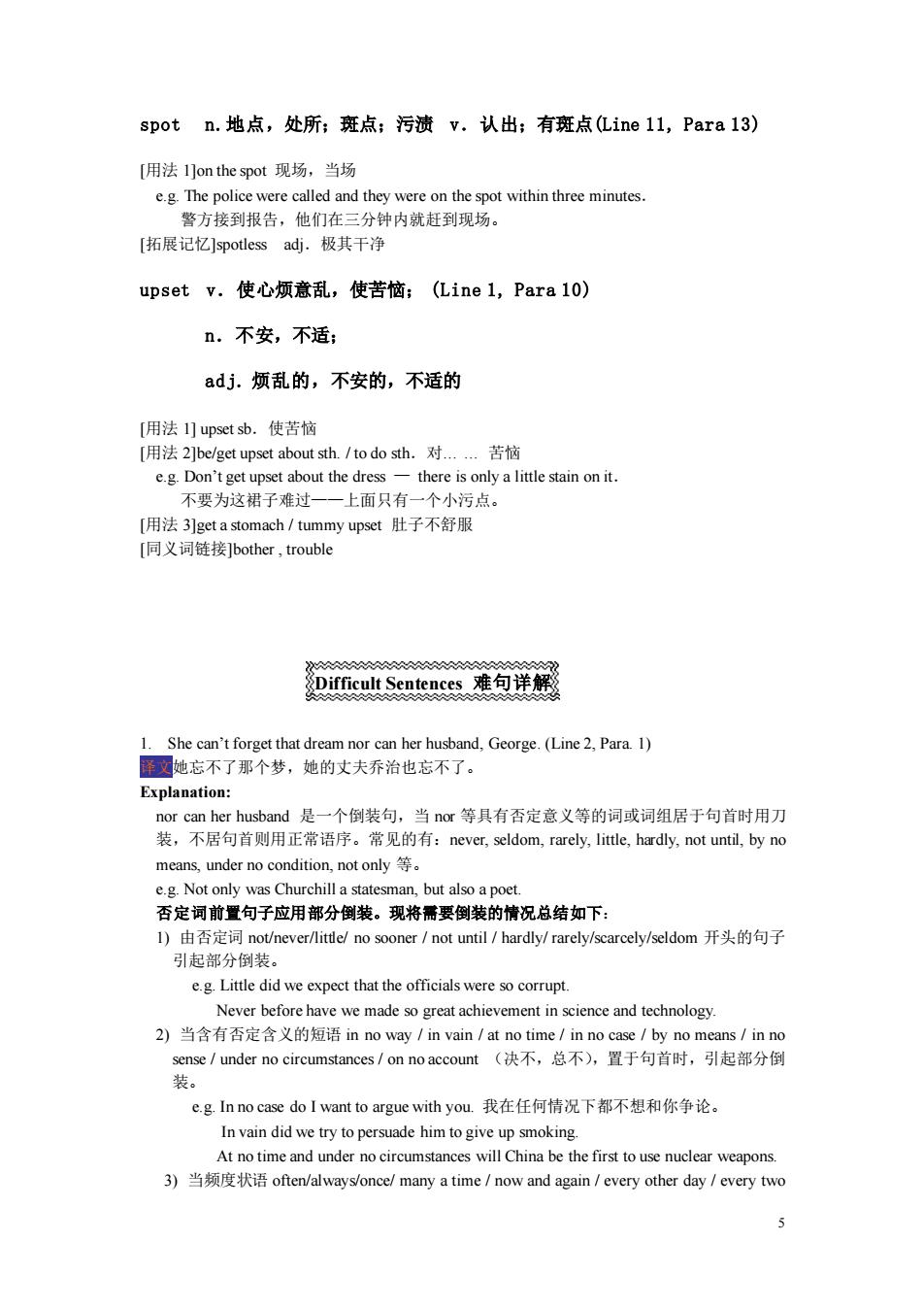
spot n.地点,处所;斑点;污渍v.认出;有斑点(亿ine11,Para 13) [用法1]on the spot现场,当场 e.g.The police were called and they were on the spot within three minutes. 警方接到报告,他们在三分钟内就赶到现场。 [拓展记忆]spotless adj.极其干净 upset v.使心烦意乱,使苦恼;(Line1,Para 10) n.不安,不适; adj.烦乱的,不安的,不适的 [用法1]upset sb.使苦恼 [用法2]be/get upset about sth./to do sth.对....苦恼 e.g.Don't get upset about the dress-there is only a little stain on it. 不要为这裙子难过一一上面只有一个小污点。 [用法3]get a stomach/tummy upset肚子不舒服 [同义词链接]bother,trouble 》 知ifficult Sentences难句详解影 1.She can't forget that dream nor can her husband,George.(Line 2,Para.1) 泽文她忘不了那个梦,她的丈夫乔治也忘不了。 Explanation: nor can her husband是一个倒装句,当nor等具有否定意义等的词或词组居于句首时用刀 装,不居句首则用正常语序。常见的有:never,,seldom,rarely,little,hardly,.not until,.byno means,under no condition,not only等。 e.g.Not only was Churchill a statesman,but also a poet. 否定词前置句子应用部分倒装。现将需要倒装的情况总结如下: 1I)由否定词not/never/little/no sooner/not until/hardly./rarely/scarcely/seldom开头的句子 引起部分倒装。 e.g.Little did we expect that the officials were so corrupt. Never before have we made so great achievement in science and technology. 2)当含有否定含义的短语in no way/in vain/at no time/in no case/by no means/inno sense/under no circumstances/on no account(决不,总不),置于句首时,引起部分倒 装。 e.g.In no case do I want to argue with you.我在任何情况下都不想和你争论。 In vain did we try to persuade him to give up smoking. At no time and under no circumstances will China be the first to use nuclear weapons. 3)当频度状语often/always/once/many a time/now and again/every other day/every two
5 spot n.地点,处所;斑点;污渍 v.认出;有斑点(Line 11, Para 13) [用法 1]on the spot 现场,当场 e.g. The police were called and they were on the spot within three minutes. 警方接到报告,他们在三分钟内就赶到现场。 [拓展记忆]spotless adj.极其干净 upset v.使心烦意乱,使苦恼; (Line 1, Para 10) n.不安,不适; adj. 烦乱的,不安的,不适的 [用法 1] upset sb.使苦恼 [用法 2]be/get upset about sth. / to do sth.对… … 苦恼 e.g. Don’t get upset about the dress — there is only a little stain on it. 不要为这裙子难过——上面只有一个小污点。 [用法 3]get a stomach / tummy upset 肚子不舒服 [同义词链接]bother , trouble Difficult Sentences 难句详解 1. She can’t forget that dream nor can her husband, George. (Line 2, Para. 1) 译文她忘不了那个梦,她的丈夫乔治也忘不了。 Explanation: nor can her husband 是一个倒装句,当 nor 等具有否定意义等的词或词组居于句首时用刀 装,不居句首则用正常语序。常见的有:never, seldom, rarely, little, hardly, not until, by no means, under no condition, not only 等。 e.g. Not only was Churchill a statesman, but also a poet. 否定词前置句子应用部分倒装。现将需要倒装的情况总结如下: 1) 由否定词 not/never/little/ no sooner / not until / hardly/ rarely/scarcely/seldom 开头的句子 引起部分倒装。 e.g. Little did we expect that the officials were so corrupt. Never before have we made so great achievement in science and technology. 2) 当含有否定含义的短语 in no way / in vain / at no time / in no case / by no means / in no sense / under no circumstances / on no account (决不,总不),置于句首时,引起部分倒 装。 e.g. In no case do I want to argue with you. 我在任何情况下都不想和你争论。 In vain did we try to persuade him to give up smoking. At no time and under no circumstances will China be the first to use nuclear weapons. 3) 当频度状语 often/always/once/ many a time / now and again / every other day / every two

hours等及方式状语置于句首时,引起部分倒装。 e.g.Thus was the Emperor deceived. Many a time has he helped me with my experiment. 4)由并列连词not only..but also:neither..nor连接句子时,如果not only或neither置 于句首时,引起句子要部分倒装。 e.g.Neither will he study nor go to school. Not only did I forget to close the window,but also I forget to sweep. S)only+状语+部分倒装 e.g.Only in this way can the operation be professional. Only then did I realize the importance of learning English. 6)从属连接词no sooner.than,scarcely..when(before),hardly..when等表示 “一·就…”概念时,且no sooner,scarcely,hardly置于句首时,引起部分倒装。此 结构中的谓语动词用“过去完成时(从句)+过去时(主句)”。 e.g.Hardly had he arrived when she started complaining. No sooner had I gone home than it began to rain heavily 7)so..that中的so位于句首时,引起部分倒装:如果谓语为be,则引起全部倒装。 e.g.So severe was the storm that the pilot couldn't fly through it. So loudly did he speak that students at the back heard him clearly. 2.I just saw you killed in a plane crash.(Line 1,Para.4) 译文我刚才梦见你飞机失事死了。 Explanation: 本句中的killed为分词,作宾语you的补足语。其他可用类似结构的动词有: lI)see,hear,feel,smell,,watch,find,notice,observe,.look at,listen to等表示感觉和心理状态 的动词。 e.g.He hasn't noticed you staring at him Her old friends found her greatly changed. If at any point you feel yourself becoming tense,make a conscious effort to relax 2)使役动词如have,make,set,keep,get,watch,catch,leave,start等 e.g.I am sorry to tell you that can't get the computer working again. Your comments left me wondering if I had done wrong. You'd better keep yourself informed of the latest news. 3.But as they went through the churchyard,Bradley felt the ground shake.(Line 4,Para.9) 译文然而,就在他们穿过教堂墓地的时候,布拉德利感到地面在震动。 Explanation: felt的原形是feeL,属系动词,这一类的系动词表示具有某种性质,特征和处于某种状态, 常见的这类动词有:smel,sniff,live,look,sound,marry,.mean,break,.bleed,remain. e.g.The man seemed to be ill. He looks to be a young girl of twenty year-old. 4.On the very edge of the footpath,he saw a huge elm shake and tremble.(Line 6,Para.13) 译文就在那条小路边上,一棵巨大的榆树摇摇晃晃。 Explanation: 6
6 hours 等及方式状语置于句首时,引起部分倒装。 e.g. Thus was the Emperor deceived. Many a time has he helped me with my experiment. 4) 由并列连词 not only… but also;neither… nor 连接句子时,如果 not only 或 neither 置 于句首时,引起句子要部分倒装。 e.g. Neither will he study nor go to school. Not only did I forget to close the window, but also I forget to sweep. 5) only + 状语 + 部分倒装 e.g. Only in this way can the operation be professional. Only then did I realize the importance of learning English. 6) 从属连接词 no sooner… than, scarcely… when (before), hardly… when 等表示 “一···就···”概念时,且 no sooner, scarcely,hardly 置于句首时,引起部分倒装。此 结构中的谓语动词用“过去完成时(从句)+ 过去时(主句)”。 e.g. Hardly had he arrived when she started complaining. No sooner had I gone home than it began to rain heavily. 7) so… that 中的 so 位于句首时,引起部分倒装;如果谓语为 be,则引起全部倒装。 e.g. So severe was the storm that the pilot couldn’t fly through it. So loudly did he speak that students at the back heard him clearly. 2. I just saw you killed in a plane crash.(Line 1, Para. 4) 译文我刚才梦见你飞机失事死了。 Explanation: 本句中的 killed 为分词,作宾语 you 的补足语。其他可用类似结构的动词有: 1) see, hear, feel, smell, watch, find, notice, observe, look at, listen to 等表示感觉和心理状态 的动词。 e.g. He hasn’t noticed you staring at him. Her old friendsfound her greatly changed. If at any point you feel yourself becoming tense, make a conscious effort to relax. 2) 使役动词如 have, make, set, keep, get, watch, catch, leave, start 等 e.g. I am sorry to tell you that can’t get the computer working again. Your comments left me wondering if I had done wrong. You’d better keep yourself informed of the latest news. 3. But as they went through the churchyard, Bradley felt the ground shake. (Line 4, Para. 9) 译文然而,就在他们穿过教堂墓地的时候,布拉德利感到地面在震动。 Explanation: felt 的原形是 feel, 属系动词,这一类的系动词表示具有某种性质,特征和处于某种状态, 常见的这类动词有:smell, sniff, live, look, sound, marry, mean, break, bleed, remain. e.g. The man seemed to be ill. He looks to be a young girl of twenty year-old. 4. On the very edge of the footpath, he saw a huge elm shake and tremble. (Line 6, Para. 13) 译文就在那条小路边上,一棵巨大的榆树摇摇晃晃。 Explanation:
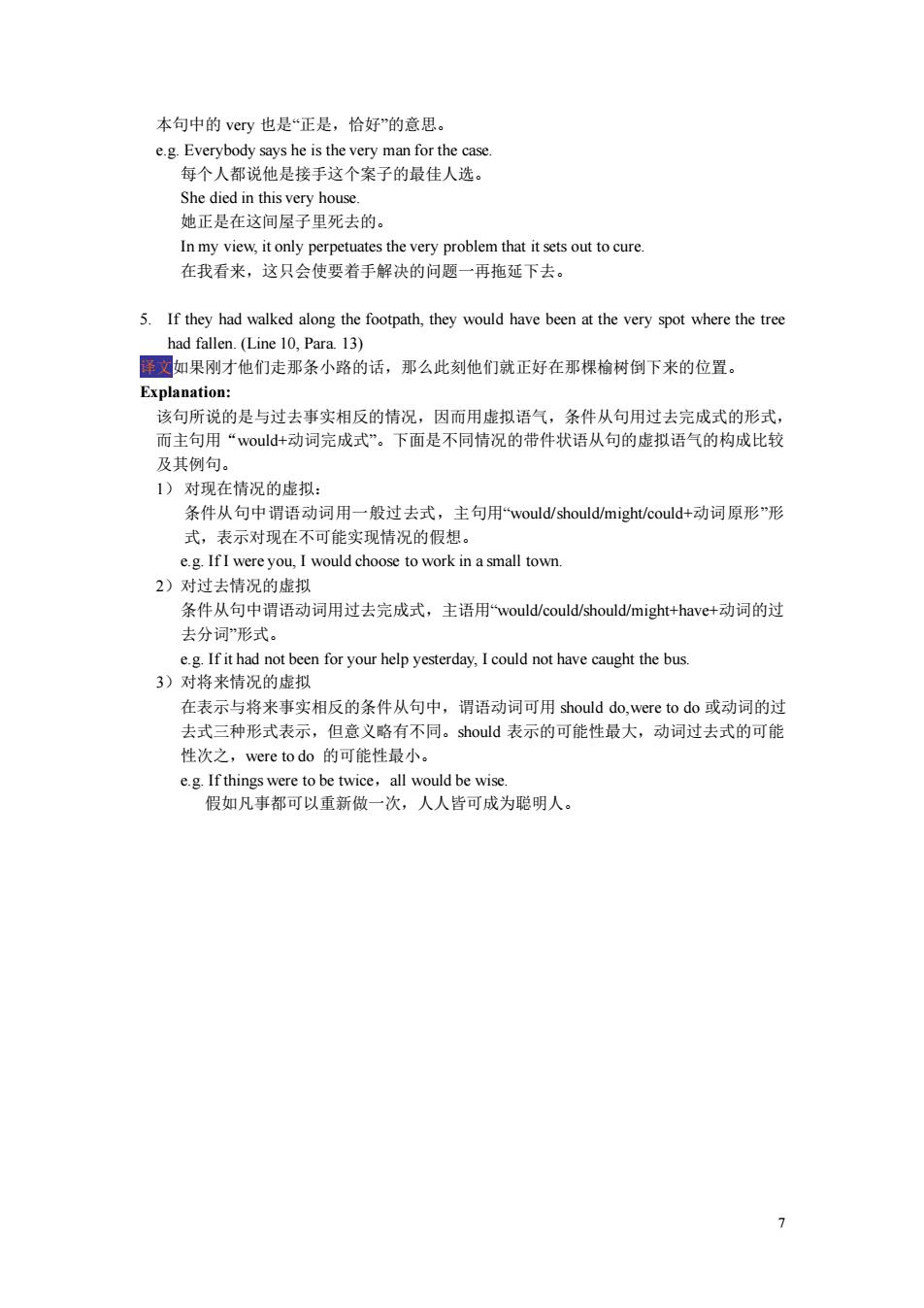
本句中的very也是“正是,恰好”的意思。 e.g.Everybody says he is the very man for the case. 每个人都说他是接手这个案子的最佳人选。 She died in this very house. 她正是在这间屋子里死去的。 In my view,it only perpetuates the very problem that it sets out to cure. 在我看来,这只会使要着手解决的问题一再拖延下去。 5.If they had walked along the footpath,they would have been at the very spot where the tree had fallen.(Line 10,Para.13) 译文如果刚才他们走那条小路的话,那么此刻他们就正好在那棵榆树倒下来的位置。 Explanation: 该句所说的是与过去事实相反的情况,因而用虚拟语气,条件从句用过去完成式的形式, 而主句用“would+-动词完成式”。下面是不同情况的带件状语从句的虚拟语气的构成比较 及其例句。 1)对现在情况的虚拟: 条件从句中谓语动词用一般过去式,主句用“would/should/,might/could-+动词原形”形 式,表示对现在不可能实现情况的假想。 e.g.If I were you,I would choose to work in a small town. 2)对过去情况的虚拟 条件从句中谓语动词用过去完成式,主语用“would/could/.should/.might+-have+动词的过 去分词”形式。 e.g.If it had not been for your help yesterday,I could not have caught the bus. 3)对将来情况的虚拟 在表示与将来事实相反的条件从句中,谓语动词可用should do,.were to do或动词的过 去式三种形式表示,但意义略有不同。should表示的可能性最大,动词过去式的可能 性次之,were to do的可能性最小。 e.g.If things were to be twice,all would be wise. 假如凡事都可以重新做一次,人人皆可成为聪明人
7 本句中的 very 也是“正是,恰好”的意思。 e.g. Everybody says he is the very man for the case. 每个人都说他是接手这个案子的最佳人选。 She died in this very house. 她正是在这间屋子里死去的。 In my view, it only perpetuates the very problem that it sets out to cure. 在我看来,这只会使要着手解决的问题一再拖延下去。 5. If they had walked along the footpath, they would have been at the very spot where the tree had fallen. (Line 10, Para. 13) 译文如果刚才他们走那条小路的话,那么此刻他们就正好在那棵榆树倒下来的位置。 Explanation: 该句所说的是与过去事实相反的情况,因而用虚拟语气,条件从句用过去完成式的形式, 而主句用“would+动词完成式”。下面是不同情况的带件状语从句的虚拟语气的构成比较 及其例句。 1) 对现在情况的虚拟: 条件从句中谓语动词用一般过去式,主句用“would/should/might/could+动词原形”形 式,表示对现在不可能实现情况的假想。 e.g. If I were you, I would choose to work in a small town. 2)对过去情况的虚拟 条件从句中谓语动词用过去完成式,主语用“would/could/should/might+have+动词的过 去分词”形式。 e.g. If it had not been for your help yesterday, I could not have caught the bus. 3)对将来情况的虚拟 在表示与将来事实相反的条件从句中,谓语动词可用 should do,were to do 或动词的过 去式三种形式表示,但意义略有不同。should 表示的可能性最大,动词过去式的可能 性次之,were to do 的可能性最小。 e.g. If things were to be twice,all would be wise. 假如凡事都可以重新做一次,人人皆可成为聪明人